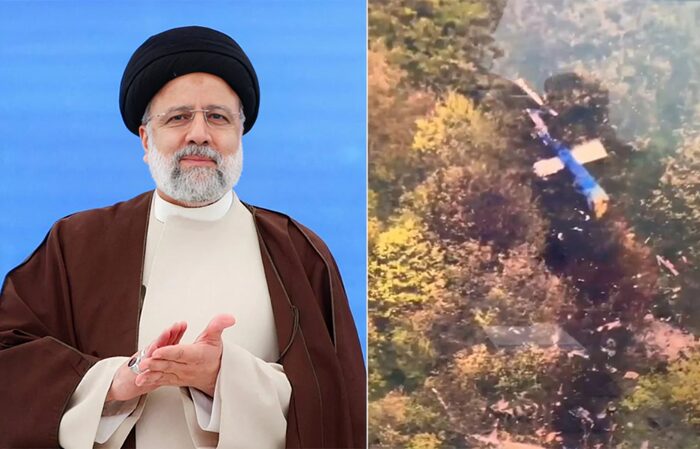Iranian President Ebrahim Raisi, Foreign Minister Hossein Amir-Abdollahian, East Azerbaijan Governor Malek Rahmati, Tabriz’s Friday prayers leader Seyyed Mohammad Ali Al-e Hashem, and bodyguard Mahdi Mousavi, along with their helicopter crew, tragically perished when their helicopter crashed into the mountains amid dense fog. They were returning from an event at the Araz River, bordering Azerbaijan, where they had inaugurated a new project.
Speculations arose from the Alt-Media Community (AMC) suggesting sabotage or an assassination plot, given Iran’s strained relations with America and Israel. Some even implicated Azerbaijan due to its close ties with Israel. However, such conjectures are premature as the investigation is just beginning. Jumping to conclusions discredits the AMC, mirroring the Mainstream Media’s (MSM) tendency to blame the West’s geopolitical adversaries without evidence.
President Ilham Aliyev’s website released the transcript of his conversation with President Raisi on that ill-fated day, emphasizing their strong bilateral relations. Raisi praised Azerbaijan and warned of unnamed adversaries envious of their bond.
Raisi highlighted the significance of their cooperation, stating, “This is a very memorable and historic day for the people of Azerbaijan and Iran, especially for those in East Azerbaijan province, Ardabil, Tabriz, and border regions. The Araz River has always symbolized the connection between Iran and Azerbaijan.”
He continued, “This project is immensely important and fosters hope among our peoples while making our enemies envious. As our Supreme Religious Leader noted, Iran’s relationship with Azerbaijan is more than neighborly; it is a kinship. This deep bond, rooted in our shared history, culture, and religion, is unbreakable and will only grow stronger.”
Raisi also addressed the impact of sanctions, stating, “Despite attempts to hinder our development, the Iranian people have built a strong, advanced nation in science and technology. I assured President Ilham Aliyev that nothing obstructs the development of relations between Iran and Azerbaijan. Our ties should be at the highest level in all areas.”
In a gesture of solidarity, Raisi congratulated Azerbaijan on restoring its sovereignty and territorial integrity, reaffirming Iran’s support for Azerbaijan’s territorial claims, particularly in Karabakh. He reiterated Iran’s readiness to cooperate on regional revival programs, emphasizing the strategic importance of ongoing projects, including the 140km railway and bridges in the Kalalah-Aghband region.
This incident and Raisi’s words underscore the complex and sensitive nature of Iran-Azerbaijan relations, as well as the broader geopolitical tensions impacting the region.
The tragic helicopter crash that claimed the lives of Iranian President Ebrahim Raisi, Foreign Minister Hossein Amir-Abdollahian, and other top officials has sparked speculation and controversy. They were returning from an event at the Araz River, bordering Azerbaijan, when their helicopter went down in foggy weather.
Some in the Alt-Media Community (AMC) suggest sabotage or an assassination plot, pointing to Iran’s tensions with the United States and Israel. Others implicate Azerbaijan, given its ties with Israel. However, such conjectures are premature and risk discrediting the AMC, mirroring the unsubstantiated claims often made by Mainstream Media (MSM).
President Ilham Aliyev of Azerbaijan shared a transcript of his final conversation with President Raisi. Raisi praised Azerbaijan and warned of unnamed enemies envious of their bond. He emphasized the significance of their cooperation, saying, “This is a memorable day for the people of Azerbaijan and Iran. The Araz River has always symbolized our connection.”
Raisi continued, “This project fosters hope among our peoples while making our enemies envious. Iran’s relationship with Azerbaijan is more than neighborly; it is a kinship. This deep bond, rooted in our shared history, culture, and religion, is unbreakable and will only grow stronger.”
Despite sanctions, Raisi noted, “The Iranian people have built a strong nation in science and technology. Our ties with Azerbaijan should be at the highest level in all areas.”
Raisi emphasized the strategic importance of Iran-Azerbaijan relations, congratulating Azerbaijan on restoring its sovereignty and reaffirming support for its territorial claims, especially in Karabakh. He highlighted their partnership through regional projects like the 140km railway and bridges in the Kalalah-Aghband region.
Speculating that Azerbaijan was involved in the crash disrespects Raisi’s legacy. He aimed to repair past mistrust and build a strong relationship with Azerbaijan. His presence at the event showed his confidence in their collaboration’s safety and significance.
While American or Israeli involvement cannot be ruled out, extraordinary claims need extraordinary evidence. Speculation without proof risks discrediting Iran if the investigation deems it a tragic accident. Jumping to conclusions about an assassination plot could undermine Iran’s credibility and response.
In this complex geopolitical landscape, it is crucial to avoid baseless allegations and await the investigation’s results to honor President Raisi’s legacy and intentions
